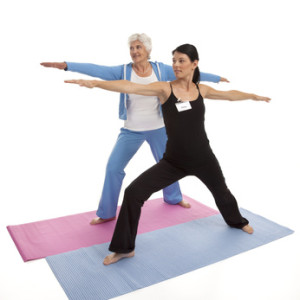Marina Nellius was diagnosed with rheumatoid arthritis at age 16. She was a ballet dancer and struggled with the meaning of her disease. She wondered, “Why does my body hate me so much?” She felt too young to have arthritis, but she was told by a doctor that she would be crippled by age 30. For a long time, she believed that. She neglected her body, was non-compliant with medications, and reports that she felt like an old lady. Marina is now in her 30s. She has two lovely kids, runs half-marathons, takes wonderful care of her mind-body-spirit, and is thriving. Read below to learn more about her remarkable journey.
Approach
Marina made an appointment at the Johns Hopkins Arthritis Center on a prayer. She felt her worst and wanted to believe that there was hope – that someone could help her to feel better. She found a compassionate rheumatologist who assured that he could help her to improve. While at the Center, she saw a flyer for a research study looking at the effects of yoga for people with arthritis. Since she had been a dancer, but didn’t feel able to dance, she thought this might be something she could try. Marina’s training came through in her yoga practice. She picked up alignment cues quickly and was willing to try more advanced poses that challenged her fitness and helped her reconnect to her body. We found modifications to address the limitations from deformity in some of her joints, particularly wrists and ankles. Several weeks into the program, the class was engaged in a small Bridge Pose. Some used a block under the sacrum for support, or rolled up and down the spine. I asked Marina if she would like to try moving into a full Wheel Pose (she didn’t have any RA involvement in her spine) and she was reluctant. We quickly moved on. But two classes later, she was willing to try. I offered support under her ribcage and pelvis as she slowly lifted from Bridge to Wheel. This was a powerful moment for Marina. She was supporting her own weight in a movement that was familiar to her, but from before her disease. She began to think of herself as being on the same team as her body instead of in a fight with it. She decided to take better care of her body so that they could work together, because clearly the Wheel was an example that she and her body could work together. She became compliant with medications, and started eating a healthier diet. That was a decade ago. She still practices yoga regularly, and uses the tools of meditation and breath every day.
 Outcome/Results
Outcome/Results
- Physical poses can have powerful meaning and impact beyond their impact on fitness
- Yoga is a form of self-care that is associated with other healthy lifestyle choices
- Hope can be fostered in a variety of ways and a few simple words (positive or negative) can have lasting implications
Recommendations
Medical professionals play an important role in setting expectations for the disease process that can direct self-care efforts for their patients. For diseases that flare, it is important to communicate that the patient will not necessarily experience steady decline, but that change should be expected over time. Within this paradigm, it is critical to help the patient understand that his/her daily choices can impact disease severity and progression. Painting a picture of gloom is not likely to empower or serve many individuals in long-term self-care efforts. Medication compliance is a key to disease management, and may be improved by fostering a realistic sense of hope. Yoga practice, under the care and guidance of a qualified yoga therapist or yoga teacher, can help to enhance self-efficacy for disease management and improve overall self-care. The breathing and meditation practices of yoga can be useful to manage psychological stress that may contribute to flares and/or result from the challenges of living with chronic disease. Additionally, the physical practice can be a safe option for maintaining fitness, while also enhancing self-efficacy for general self-care. Feeling capable in one’s body, regardless of diagnosis or disease status, can be transformative and may have ripple effects into many areas of life.
Reprinted with permission from Dr. Steffany Moonaz.
Dr. Steffany Moonaz is a yoga therapist and researcher and serves as Assistant Director of Academic Research at the Maryland University of Integrative Health. Dr. Moonaz is working to bring yoga to people with arthritis in communities around the country, as well as educating yoga teachers and yoga therapists about the unique needs of this population. She currently leads Yoga for Arthritis teacher training programs nationwide and serves as a mentor for several emerging researchers who are working to study the effects of yoga for various health conditions.

